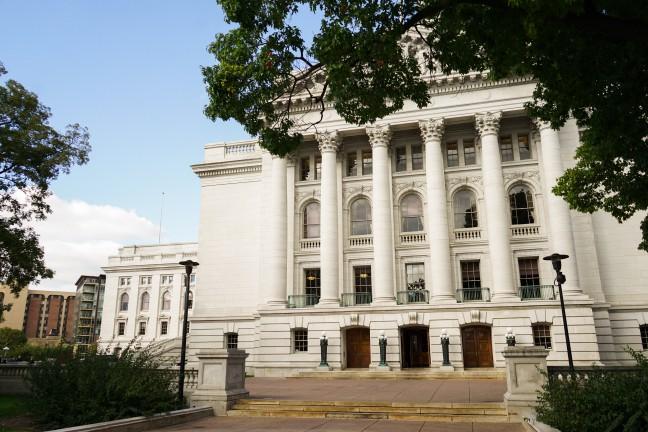Buried amid the presidential primary and local elections in April is the state Supreme Court race; as the highest court in the state, the Supreme Court holds the power to make decisions that can impact campus life.
This election cycle, incumbent Supreme Court Justice Rebecca Bradley will face Appeals Court Judge JoAnne Kloppenburg.
Here is what students need to know to navigate the elections and how it can affect campus life.
From landmark rulings like Act 10 to voter ID laws, the Wisconsin Supreme Court serves an important role in state government. The court theoretically acts as a non-partisan check against legislative overreach, but some say the reality of it is different.
What the supreme court does
Howard Schweber, University of Wisconsin expert in judicial elections, said the courts are responsible for hearing legal challenges to statewide laws. For example, recent challenges were made to laws that now require voters to show a Wisconsin photo ID prior to voting and dismantled public and private unions.
Even if student voters don’t care about this aspect of the court, Schweber said students should care and know about the legal body’s role of policing the government.
“Issues of transparency in government and corruption — I’m not sure these are things students think about, but I certainly wish they would,” Schweber said.
The court today
Schweber said 10 years ago, Wisconsin was considered a “clean government,” but dishonesty in the courts has since led to what he called “legal corruption.”
Laws now permit conflicts of interest whereby investigators can receive funds from the target of their investigation, Schweber said. This, in contrast to the traditional sense of corruption, is where money changes hands behind closed doors, he said.
“The justices themselves have received large sums of money from the very people who were the targets of investigations that they shut down,” Schweber said. “There is a whole circle of sleaze happening.”
Ald. Zach Wood, District 8, said he also thinks the status of the courts as a non-partisan policing entity has eroded in the past decade. He pointed to Bradley recently fundraising with Republican legislators.
On March 14, a Bradley fundraiser featured several sitting Republican senators as speakers such as Sen. Alberta Darling, R-River Hills. Gov. Scott Walker previously appointed Bradley to lower court positions and defended her against criticisms of an opinion piece she wrote as a student in which she posited that AIDS victims deserved no sympathy, among other things.
Kloppenburg on the other hand, while supported by Democrats, has managed to avoid overtly partisan fundraising efforts.
Wisconsin justice under fire for homophobic comments made in college newspaper
The existence of a super majority within the state Legislature means the main enforcer of government accountability is now the state Supreme Court, making the court’s deterioration especially troubling, Wood said.
How the court affects students
The court is also important because of its role in settling appeals on state laws.
One example of the Supreme Court’s influence on student life includes the upholding of reductions to landlord-tenant protections, Wood said. The Legislature recently approved a bill that allows landlords to evict tenants for any sort of “criminal activity,” which could include noise violations stemming from a party.
Bill on Walker’s desk would allow landlords to evict tenants for ‘criminal activity’
While presently there are no momentous decisions awaiting the Supreme Court, Schweber said questions on access to abortion and other health issues will almost certainly be entertained in the not-so-distant future.
The Supreme Court also deals with more obscure areas of state law such as product liability and insurance law, Schweber said. Despite not receiving much attention, these areas of law are still important should anyone find themselves pursuing a legal suit, he said.
“The state Supreme Court rules on all questions of state law,” Schweber said. “So the make up of the court and the attitude of the court will have effect across the board.”
Ultimately, the Supreme Court will likely not affect students to the same extent as funding changes by the state government, Schweber said. But if students wish to live in Wisconsin for any length of time, they should care about the court because of its power to determine the character of the state, he said.
The election is April 5.

















